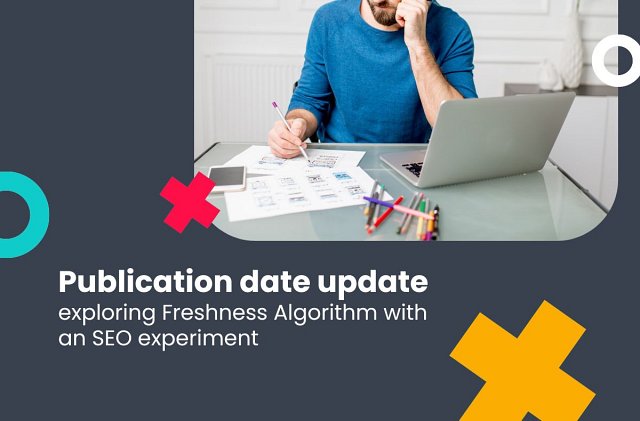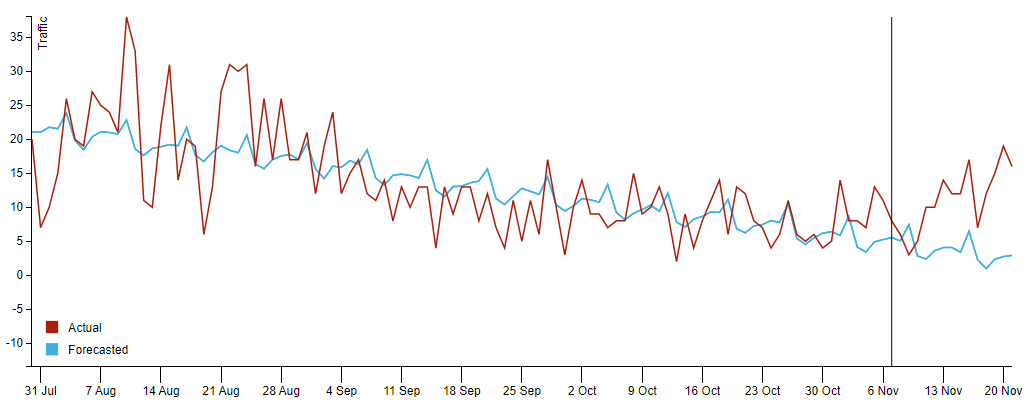(10 min. read)

Table of Contents
- Google freshness algorithm
- The hypothesis – what date update will change
- Experimental conditions
- Experimental manipulation
- The results of the experiment – how date update impacts site metrics
- Research hypothesis verification
- CausalImpact statistical model and date update experiment
- Date update on WhitePress®
Google's freshness algorithm ranks pages in SERPs according to how important the timeliness of the content is for a given query. In our experiment, we will determine whether a mere change of date in the site code is a sufficient indicator of freshness for Google's algorithm.
Due to diverging opinions in the SEO industry about the importance of content topicality as a ranking factor, we decided to test the impact of the “freshness” of content on page positions in search results. Remembering the words of John Mueller,
“changing publishing dates on web pages will not improve search rankings if no significant changes were made to the content”,
we decided to see if Google's algorithm only accounts for substantial changes to the content, as Mueller claims, or if a simple date modification would be enough for a subpage to be considered fresh and updated. To achieve this goal, we carried out an experiment – in which we updated the publication dates of articles without making any other changes to the tested subpages.
Google freshness algorithm
To better understand our experiment, let us first explain what freshness is according to Google. The term appeared on the SEO stage in 2011 with the Google Freshness Update.
The search engine's algorithm update introduced publication time as a ranking factor, together with a division of search queries into three types, according to the relevance of publication time for the inquiry term:
- Recent events – Typically news-related queries that are associated with current and trending topics or events.
- Regularly recurring events –Annual or regularly occurring events – sports scores, TV shows, elections, yearly reports.
- Frequent updates – Queries that are regularly updated but are not related to events or trending topics. May be associated with review sites or product pages.
The freshness factor determines the relevance of indexed pages for entered queries (depending on the search type) based on the publication date and content updates.
Google informs that it is using multiple factors to determine an article's publication date. In addition to structural data, search engines use alternative, however undefined, data sources to eliminate errors.
The hypothesis – what date update will change
The experiment hypothesis states that updating the publication date will result in a higher average position in SERP (Search Engine Result Page) and the acquisition of new keywords. Furthermore, it will indirectly impact positively the number of clicks, impressions, and CTR (click-through rate) metric.
The premise of our experiment assumes that the date provided in the HTML code within the <div> element specifying the publication date and structured data in JSON format are relevant factors utilized by Google's algorithms to determine the time relevance of a page.
Therefore, updating this date should be a sufficient signal for Google to consider modified pages relevant to a query, due to their “freshness.”
Many professionals associated with Google imply that the search engine's algorithm recognizes whether the publication or modification date corresponds to significant changes in content. That would mean that only pages with modified content can acquire higher positions due to the freshness factor. Our study will demonstrate whether this assumption is valid.
Experimental conditions
To ensure that the experiment results are error-free, we defined an environment that would be as free from external factors as possible, in which we could conduct the tests.
As an experimental environment, we chose a domain free of traffic interference (below is a line graph of Google Search Console: Effectiveness in search results), on which:

- no optimization activities were carried out for at least 90 days prior to the implementation of the tested experimental manipulation;
- no other changes, apart from the experimental manipulation, were made on the site during the experiment (a 14-day period), which could affect positioning in search results;
- no paid traffic campaigns (SEM) were run.
Next, we divided pages into the experimental group (pages on which we introduced experimental manipulations) and the control group (web pages on which we did not make any changes).
For the experiment, we selected the subpages:
- published no later than December 31, 2021;
- belonging to the same category of subpages: blog posts;
- generating substantial organic traffic;
- indexed by Google;
- without any optimization (on-site or off-site) performed.
Subpages were divided into two groups, using the AB/
- generated organic traffic,
- number of keywords they rank for,
- keyword difficulty,
- search volume for ranked keywords,
- backlink profile,
- placement in the site structure.
We selected 64 pages to participate in the date update experiment, and we divided them into two groups (control and experimental) with 32 sub-pageseach.
To ensure no data infringement, we suspended navigation to the selected sub-pages by our team through Google search during the preparation and duration of the test. Hence, we eliminated the possibility of disturbing the experiment results with our searches and clicks.
Experimental manipulation
On all the pages selected for the experimental group, we introduced a change in the code that updated the publication date of articles to the date the experiment started, November 7th, 2022.
The date was provided in the HTML code format:

and in JSON format:

We did not introduce any other changes during the experiment, neither in content, code, nor site structure.
Additionally, we disabled the pages subjected to the experiment from being displayed on the homepage as the latest posts. Thanks to it, the link structure remained unchanged, and no additional internal backlinks were created.
The results of the experiment – how date update impacts site metrics
Knowing the conditions of the experiment and its scope, let's discuss the outcomes observed from November 7th to November 21st, compared to the previous 14-day period.
The number of clicks increased by 43.8% in the experimental group. The number of link clicks in SERPs rose from 112 in the preceding period to 161 during the experiment. In the control group, we observed a decrease of 6.1%, from 164 clicks in the prior period to 154 during the test.
The CTR increased in the experimental group by 24.5%, from a rate of 1.91% to 2.38%. In the control group, we observed a decrease in the CTR value of 5.0% from 1.82% to 1.73%.
The number of impressions in the experimental group increased by 15.4%, from 5,862 before the test began to 6,767 during the experiment. In the control group, impressions decreased by 1.2% from 9,012 to 8,905.
The average position decreased in the experimental group by 2.0%, while in the control group it decreased by 4.2%. In summary, the average position of the pages in the control group diminished by 110 percent more than that of the group subjected to the experiment. It is tied with 82 new queries acquired for subpages placed in the experimental group. Since ranking for new queries usually starts at low positions, it brought down the average position for the whole group.
The number of queries generated by subpages rose by 20.3% in the experimental group. In the control group, this metric grew only by 0.3%, which means that the experiment manipulation resulted in a 6767% higher increase in the number of queries. The experimental group acquired 82 new keywords, growing from 404 to 486.
Research hypothesis verification
The proposed hypothesis assumed an improvement in the number of clicks, the CTR metric, and the impressions number. All these conditions were met.
Still, the average position in SERPs fell by 2.0%, so the sub-pages from the experimental group occupy lower positions in Google rankings than before manipulation was introduced. Does this become the basis for questioning our hypothesis? Absolutely not. Looking at the control group, we will notice that the average position got reduced by 4.2% compared to the period preceding the test. So the decrease in position was in fact 110 percent larger in the control group.
The 20.3% increase in the number of queries in the experimental group implies acquiring a considerable number of new key phrases. Let's remember that the path to ranking a site for a new keyword usually starts with lower positions in search results. Pages from the experimental group have gained over 80 queries, which indirectly led to a decrease in the average position in search results by 2.0%. If we take into account only phrases that the pages from the experimental group were ranking for before the date update, we can notice an improvement of position by 12.67%.
What does this mean? The Google algorithm probably assigns a value to “freshness” based solely on the date information included in the structured data. This indication may be stronger for sub-pages whose content has also been updated. But still, modifying only the publication date is a sufficient indicator of freshness for the Google search engine.
CausalImpact statistical model and date update experiment
To confirm that the increase in traffic on testing sub-pages is the result of the introduction of experimental manipulations, we used a tool provided by SearchPilot. The Distilled Split Tester uses the Google-created causal impact analysis model to determine the expected organic traffic after the introduction of experimental modifications.
The tool used accumulated traffic data for the experimental and control groups during the testing and the 100 days preceding the start of the experiment. The provided data allows for outlining the projected traffic (in case no experimental changes have been introduced) and comparing it to the current performance of the tested sub-pages.
In the case of our experiment, the organic traffic in the test group was 183% higher than the expected values – if no experimental changes had been made. This analysis confirmed that the increase in traffic is directly the result of the introduced changes and not a growth trend in the tested domain.
In the linear chart below, we present these differences. The vertical black line represents the beginning of the experiment. The red line illustrates the actual changes in traffic on the page, while the blue line represents the forecasted traffic based on the causal impact analysis.
Date update on WhitePress®
How much do we believe in the results of this experiment? In our opinion, they are strong enough to utilize the date updates on our site: whitepress.pl.
The results of employing these changes were favorable (as expected):
- The number of user clicks rose by 64.1% on pages with a modified date. The number of impressions increased by 1758.8% – according to Google Search Console data.
- According to Google Analytics reports, the number of sessions increased by 58.1% and the number of users increased by 56.4%.
Therefore, the benefits of introducing date updates are tangible, and they have a positive impact on the process of ranking web pages in Google search results.




